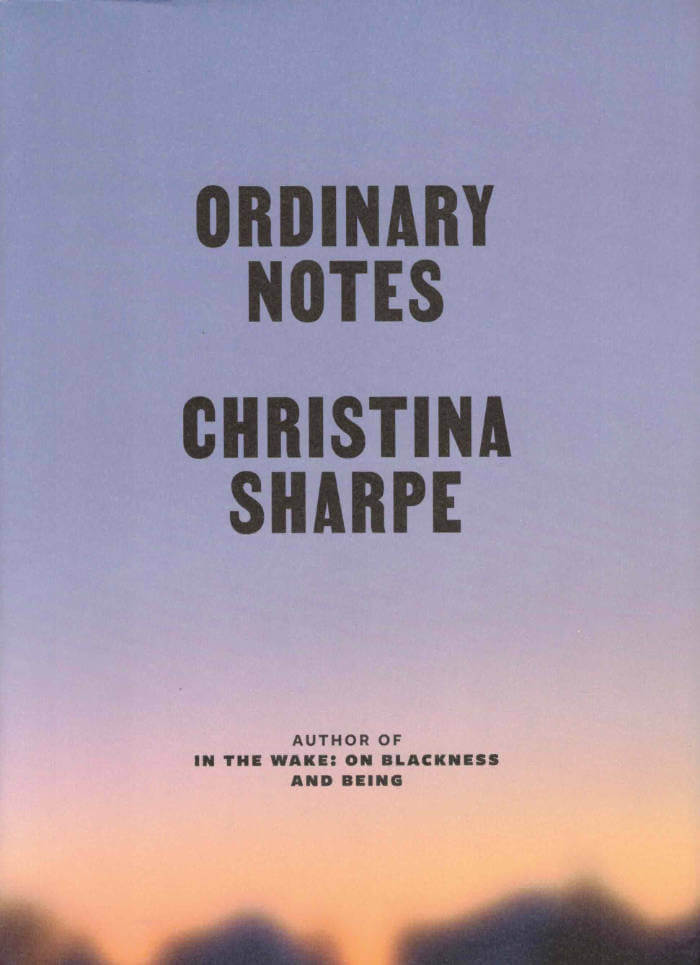Christina Sharpe
Christina Sharpe

Ordinary Notes
A singular achievement, Ordinary Notes explores profound questions about loss and the shapes of Black life that emerge in the wake. In a series of 248 notes that gather meaning as we read them, Christina Sharpe skillfully weaves artifacts from the past—public ones alongside others that are poignantly personal—with present realities and possible futures, intricately constructing an immersive portrait of everyday Black existence. The themes and tones that echo through these pages—sometimes about language, beauty, memory; sometimes about history, art, photography, and literature—always attend, with exquisite care, to the ordinary-extraordinary dimensions of Black life.
At the heart of Ordinary Notes is the indelible presence of the author’s mother, Ida Wright Sharpe. “I learned to see in my mother’s house,” writes Sharpe. “I learned how not to see in my mother’s house . . . My mother gifted me a love of beauty, a love of words.” Using these gifts and other ways of seeing, Sharpe steadily summons a chorus of voices and experiences to the page. She practices an aesthetic of "beauty as a method,” collects entries from a community of thinkers toward a “Dictionary of Untranslatable Blackness,” and rigorously examines sites of memory and memorial. And in the process, she forges a brilliant new literary form, as multivalent as the ways of Black being it traces.
And more

Diversity of Aesthetics
Jose Rosales, Andreas Petrossiants
Critical conversations and reflections about lessons learned at the intersection of social movements and artist production.
Diversity of Aesthetics collects powerful and timely conversations among leading cultural critics, artists, and organizers to connect the threads between some of the most pressing social struggles and conflicts of our time: policing, war, borders and migration, economic crisis.
Across three themes—infrastructure, migration, and riots—militant thinkers, artists, educators, and others discuss aesthetic production, forms of social organization, modes of struggle against gendered and racialized capitalism, and revolutionary theory. Common to all three conversations is a commitment to rethinking the relationship between forms of critique and forms of struggle undertaken by collective social practices, offering lessons for tactics, strategies, and practices.
With contributions by Claire Fontaine, Iman Ganji, Saidiya Hartman, Vicky Osterweil, Andreas Petrossiants, Christina Sharpe, Stevphen Shukaitis, Michael Rakowtiz, Shellyne Rodriguez, Jose Rosales, Rinaldo Walcott, Andreas Petrossiants, Jose Rosales
Andreas Petrossiants is a writer and associate editor of e-flux journal. His work has appeared in Historical Materialism, Social Text, New Inquiry, AJ+ Subtext, Frieze, Bookforum.com, Roar Magazine, the Verso blog, the Brooklyn Rail, Hyperallergic. He is a PhD candidate in performance studies at NYU where he is researching anti-eviction, squatting, and tenants’ movements as they relate to the production of social space.
Jose Rosales is an independent researcher and journalist based in Lisbon, Portugal. His work has appeared in e-flux notes, Lumpen: A Journal of Poor and Working Class Writers, and has contributed a chapter called “Communism As the Riddle Posed to History” in Double Binds of Neoliberalism (2022).

Why are they so afraid of the lotus?
Based on questions raised by the work of filmmaker Trinh T. Minh-ha, the second volume of the Wattis Institute's annual reader includes new writing and art by Ranu Mukherjee, Kathy Zarur, Shylah Hamilton, Astria Suparak, and Tamara Suarez Porras, as well as written and visual contributions by Trinh T. Minh-ha, Mei-mei Berssenbrugge, Sky Hopinka,Christina Sharpe, Christine Wang, Camille Rankine, Dionne Brand, Renee Gladman, Theresa Hak Kyung Cha, Kameelah Janan Rasheed, and Steffani Jemison, among others.
What does the promise of "speaking nearby" rather than "speaking about" look like today? What are the politics of hospitality? What are the problematics of "postfeminism," and how do we challenge the West as the authoritative subject of feminist knowledge? What are the ways that language can be a site of rupture? How do we generate mistrust in the "well-written," and how can poetry be a radical act of refusal? How can we be subjects that believe in land and not borders? What influence has technology and digital space had on the "making and unmaking of identity"? How do we navigate a cyclical eruption of decolonizations?
The Wattis Institute's annual reader, A Series of Open Questions, provides an edited selection of perspectives, images, and references related to the Wattis's year-long "On our mind" research seasons. Each volume includes newly commissioned writing by members of the research season's core reading group, as well as text and visual contributions by a diverse range of other artists and writers. The title of each reader takes the form of a question and becomes, as new books are published, a gradually evolving series of open questions.